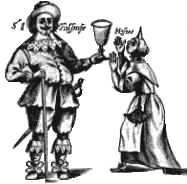Falstaff: Sir John Sack-and-sugar
The character we now know as Falstaff was so notorious a braggart soldier and drunkard (hence his nickname Sir John Sack-and-Sugar) that his original name, Sir John Oldcastle, had to be changed to avoid confusion with a more respectable knight of that name.
As the illustration shows, Falstaff was so popular that he continued to turn up on stage in new plays, even after Shakespeare's death. Part of his attraction is his wit, his language; part is in the way he moves between the two worlds of the nobility, and the rogues and thieves of Gad's Hill.
Footnotes
-
The fat man with the quick wit
One obvious difference between the language of Falstaff and the language of the Court is that Falstaff speaks in prose, while the nobles speak in verse--and only Prince Hal switches back and forth. (Click for more.)
Although Falstaff speaks only in prose, he is able to adapt his speech wittily to suit the occasion. One of the most notable occasions is his parody of Court euphuism in the passage where he acts Prince Hal's father.
